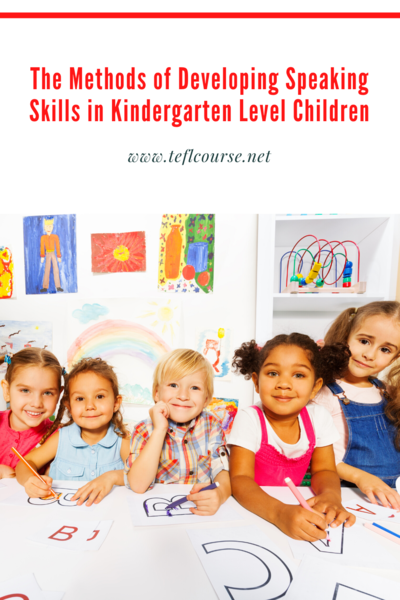The Methods of Developing Speaking Skills in Kindergarten Level Children

Kindergarten students are those who are typically around the age of five. From birth till five, they would have developed their sensory and speaking abilities in their mother tongue with decent fluency. Children at this age have a strong potential to gain a lot of information. They would know about 1000-2000 words by this time. At this age, they are formally introduced to reading and writing skills, group work, independent thinking, and sharing practice. Teaching children at this age can be quite challenging and fun. Vocabulary is one of the strongest predictors when it comes to speaking capacity. So, by carefully incorporating study into play we can enrich their speaking abilities.
Table of Contents
WAYS TO DEVELOP SPEAKING SKILLS
PRETEND PLAY, GROUP WORK ACTIVITIES
Do you want to teach English abroad? Take a TEFL course!
This post was written by our TEFL certification graduate Manickalakshmi S. Please note that this blog post might not necessarily represent the beliefs or opinions of ITTT.
WAYS TO DEVELOP SPEAKING SKILLS
Reading and speaking skills are both important when it comes to language learning. To be able to speak fluently, reading is very important. When children are exposed to a language-rich environment at home and at school, it creates an opportunity for them, to develop their productive skills. It is said that "receptive skills are stronger than the productive skills" when it comes to vocabulary learning. So, when they are exposed to more new words their degree of fluency intensifies. This can be usually done at school through activities, play-time, discussions, rhymes, pretend play, group discussions, etc. Similarly, at home parents can help their child to speak by playing games and involving them in everyday situations like dress up, shopping, sorting laundry, etc. Initially, even before learning the words and its meaning properly, the children learn in phrases, in the form of sentences. This is usually obtained from what they hear from their surroundings.
A few engaging activities to enrich speaking abilities are activity areas, storytelling, reading, group work activities, nursery rhymes, pretend play, teaching vocabulary through some games, etc. some of which are briefly explained below.
Also read: Getting Student Placement Right - The Best Desk Arrangements for EFL Students
ACTIVITY AREAS
Kindergarten teachers can include various activity areas in their classrooms dedicated to arts & science, Mathematics, etc. as per their curriculum. These areas can be utilized to host and portray different subject matters in various forms like pictures, mini-prototypes, shapes, etc. So, in this way, children will get easier familiarity with new words and concepts, say, in the science area, like sun, moon, air, water, wind, and in math area, like shapes, numbers, counting, by practically looking at it.
STORYTELLING AND READING
According to a recent scientific consensus, it is said that shared reading amplifies interest in reading. Especially, if a kid is accompanied by an adult with pictured books, they get more excited, generate more interest, and hence pay close attention. This will influence and inculcate reading habits in them and make them better readers in the long term.Additionally, we can ask the children to predict the story by seeing the pictures in the book. This will further inspire them to be more curious about the story. We can then read the story aloud with expressions and ask them questions relative to the story. Asking questions will enhance the opportunity to speak and will kindle their responsiveness.
STORY BASKET
An exciting alternative method to storytelling is the idea of the story basket. We can either use a story from a book or customize it on our own. Place a few toys and objects inside the basket and ask them to take turns and tell a story by taking three toys or so from the basket. They will come up with different ideas. Patiently listen to them until they finish and then appreciate them for their attempt.
Also read: Top Online Lesson Plan Resources for New and Advanced Teachers
HAVING CONVERSATION WITH THEM
This can be done by asking simple questions to them and when they give a short answer we can expand them. When the teacher does this the child will have a chance to know that "short answers can be expanded". For example,Child: I like that!Teacher: Do you like that toy teddy?Child: Yes and is red.Teacher: Oh yes! it is red in color and it is a big teddy.Furthermore, the teacher can invite the child to speak up and can teach them to learn new words, as you see in the above example like "color, toy teddy, big".
PRETEND PLAY, GROUP WORK ACTIVITIES
Pretend play is something which children start at the age of 15-18 months of age. However, this may vary at every age until 5 or 6. Typically at the age of 5, children at school are taught to role-play with their friends in their class. When they do role-play they pretend to be someone whom they have never seen before or roles which they have never experienced before like firemen, superheroes, etc. This helps in social development as well as language development.
Also Read: Why Beijing Is the Ideal Place to Teach English
TEACHING VOCABULARY
These are a few simple strategies to teach vocabulary to children and make learning fun.* Explain the word and its meaning in a simple form.* Do any actions/gestures if possible.* Try to show some pictures or bring a real object.* Repetition is the key, drill the words/phrases a couple of times.
Do you want to teach English abroad? Take a TEFL course!
We can follow a typical free/creative speaking lesson in Engage Study Activate(ESA) method as per their level. Make sure not to give priority to any favorite student. Have a balance with slow and fast learners. Have a lot of extra materials for back up. Being fair, consistent, energetic, and planning ahead will take a long way through. Lastly, we can cheer them up by giving rewards as a token of appreciation; this can be both physical and non-physical. Thus, these techniques are considered simple yet powerful to develop kindergartners speaking abilities.
Apply now & get certified to teach english abroad!
Speak with an ITTT advisor today to put together your personal plan for teaching English abroad.
Send us an email or call us toll-free at 1-800-490-0531 to speak with an ITTT advisor today.
Related Articles:
- 3 Awesome Reasons to Become an EFL Teacher Abroad
- Top 10 Things To Know When Moving Abroad To Teach English
- How To Write The Perfect ESL Lesson Plan
- Online or In-Class - Which TEFL Course Should You Take?
- How To Write The Perfect ESL Lesson Plan
- Getting Student Placement Right - The Best Desk Arrangements for EFL Students




